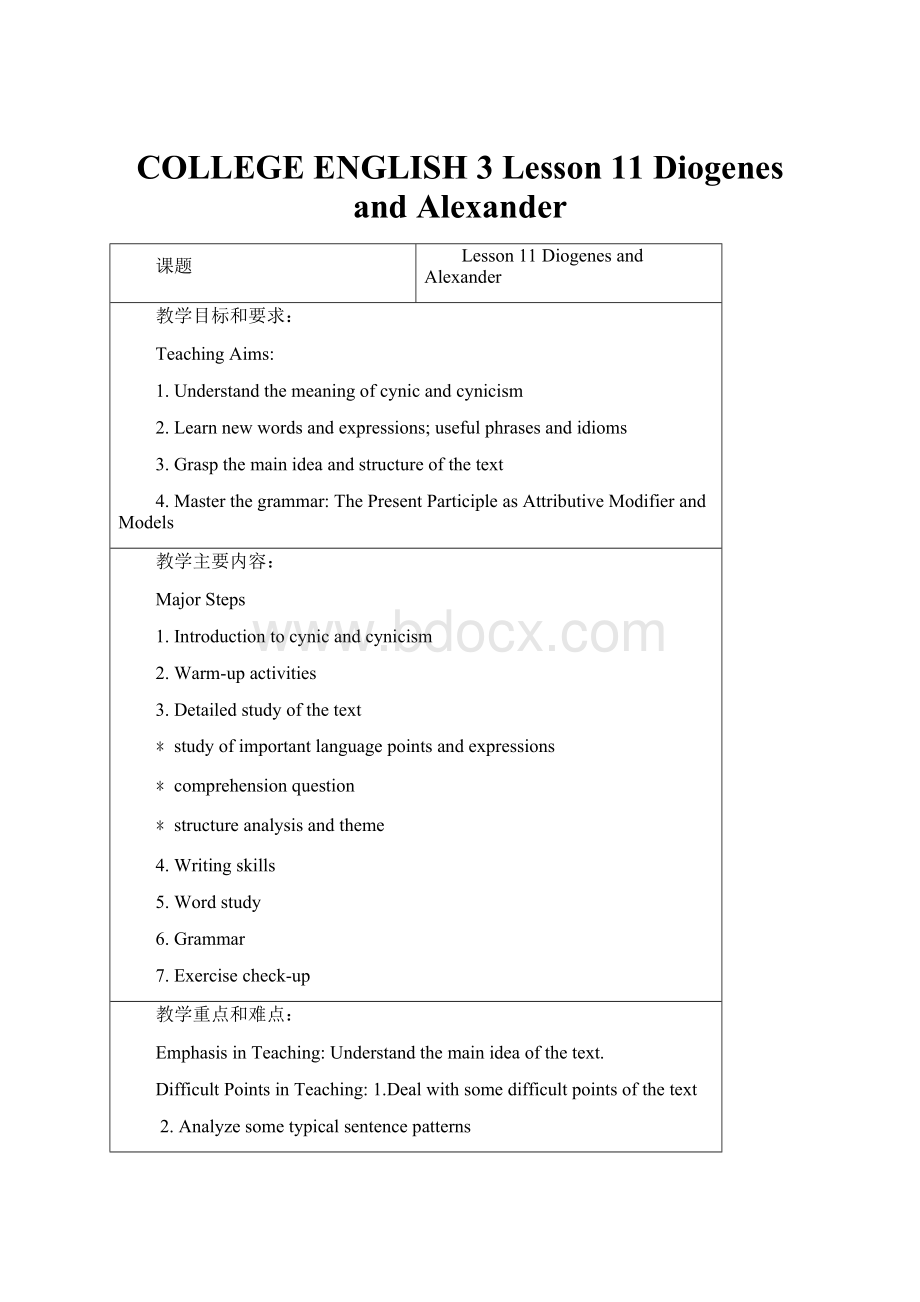COLLEGE ENGLISH 3 Lesson 11 Diogenes and Alexander.docx
《COLLEGE ENGLISH 3 Lesson 11 Diogenes and Alexander.docx》由会员分享,可在线阅读,更多相关《COLLEGE ENGLISH 3 Lesson 11 Diogenes and Alexander.docx(11页珍藏版)》请在冰豆网上搜索。

COLLEGEENGLISH3Lesson11DiogenesandAlexander
课题
Lesson11DiogenesandAlexander
教学目标和要求:
TeachingAims:
1.Understandthemeaningofcynicandcynicism
2.Learnnewwordsandexpressions;usefulphrasesandidioms
3.Graspthemainideaandstructureofthetext
4.Masterthegrammar:
ThePresentParticipleasAttributiveModifierandModels
教学主要内容:
MajorSteps
1.Introductiontocynicandcynicism
2.Warm-upactivities
3.Detailedstudyofthetext
﹡studyofimportantlanguagepointsandexpressions
﹡comprehensionquestion
﹡structureanalysisandtheme
4.Writingskills
5.Wordstudy
6.Grammar
7.Exercisecheck-up
教学重点和难点:
EmphasisinTeaching:
Understandthemainideaofthetext.
DifficultPointsinTeaching:
1.Dealwithsomedifficultpointsofthetext
2.Analyzesometypicalsentencepatterns
教学方法和使用教具:
Teachingmethods
1.Task-basedLanguageTeachingApproach(pairworkandteamwork)
2.Interactiveteachingapproach
Teachingaids
1.Teachingnotespreparedbytheteacher
2.1blackboard
3.AComputerandOverheadprojector
提问讨论:
Discussion:
1)Whatdoyouthinkofthepersonwhoislyingonthestreet,shoeless,bearded,half-naked?
2)Whatisthemainideaofthetext?
3)IftheworldweretofollowDiogenes,whatwouldbetheresults?
4)DoesDiogenesremindyouofanyancientChinesephilosopher?
Wouldyouliketomakeacomparisonbetweenthem?
Questionsonpages399-401inthetextbook.
布置作业:
1)Recitetheusefulphrasesandidiomsonpage397
2)UnderstandmoreaboutDiogenesandAlexanderthroughinternet
3)Finishvocabularyexercises
4)Recitetherequiredparagraph
TeachingNotes
IntroductiontoGreekphilosophies
DoyouknowwhereandwhenthefirstOlympicGameswereheld?
Greece—itsmainlandislocatedinthesoutheastEuropeonthesouthernBalkanPeninsula(巴尔干半岛),withnumerousislands(around3,000)intheMediterranean(地中海),Aegean(爱琴海),andIonian(爱奥尼亚海)seas.Itisoneofthemostimportantcentersofearlycivilization.
Freeintellectualandscientificexplorationstartedmeninsearchafterfactsandlawsofnatureandproducedmanygreatphilosophersandmenofscience.
TherearemanyfamousphilosophersinancientGreece.Couldyounamesomeofthem?
“Givemeaplacetostand,andIwillmovetheworld.”–Archimedes[ɑ:
ki'mi:
di:
z].
Socrates(469-399BC)AGreekphilosopherfromAthens,whowastheteacherofPlatoandwhoseideasareknownfromPlato’swritings.Heisknownforencouragingpeopletothinkcarefullyaboutideasbeforeacceptingthemandfordevelopingthemethodofexaminingideasaccordingtosystemofquestionsandanswersinordertofindoutthetruth.ThisisknownastheSocraticmethodordialectic.TheGreekauthoritiesdisapprovedofhisideasandmethods,andsaidhewasabadinfluenceonyoungpeople.Theyforcedhimtokillhimselfbydrinkinghemlock,apowerfulpoison.
Plato(427?
-347B.C.)wasaGreekphilosopher,afollowerofSocrates.HefoundedtheAcademy,wherehetaughtandwroteformuchoftherestofhislife.Platopresentedhisideasintheformofdramaticdialogues,asinTheRepublic.
Aristotle(385-323B.C.)wasthegreatestofheathenphilosophers.ApupilofPlato,thetutorofAlexandertheGreat,andtheauthorofworksonlogic,ethics,metaphysics,naturalsciences,politics,andpoetics,heprofoundlyinfluencedWesternthought.Inhisphilosophicalsystem,theoryfollowsempiricalobservation,andlogic,basedonthesyllogism,istheessentialmethodofrationalinquiry.
Antisthenes (c.445BCE–c.365BCE)wasa Greekphilosopher andapupilof Socrates.Antisthenesfirstlearned rhetoric under Gorgias beforebecominganardentdiscipleof Socrates.Headoptedanddevelopedthe ethical sideofSocrates'teachings,advocatingan ascetic lifelivedinaccordancewith virtue.Laterwritersregardedhimasthefounderof Cynic philosophy.
DiogenesThebestknownoftheCynics,apupilofAntisthenes;livedinabarrelandownednothingbutacloak,astick,andabreadbag.DescribedbyPlatoas“aSocratesgonemad”.Forhisvagrantlifestyle,Diogeneswasnicknamed“thedog”(fromwhichthename"cynic"isderived”).(Whywashecalledadog?
Diogenes:
"BecauseIfawnuponthosewhogivemeanything,andbarkatthosewhogivemenothing,andbitetherogues.")
CynicismoriginallycomprisedthevariousphilosophiesofagroupofancientGreekscalledtheCynics,foundedbyAntisthenesinaboutthe4thcenturyBC.TheCynicsrejectedallconventions,whetherofreligion,manners,housing,dress,ordecency,advocatingthepursuitofvirtueinasimpleandunmaterialisticlifestyle.TheclassicalGreekandRomanCynicsregardedvirtueastheonlynecessityforhappiness,andsawvirtueasentirelysufficientforattaininghappiness.ClassicalCynicsfollowedthisphilosophytotheextentofneglectingeverythingnotfurtheringtheirperfectionofvirtueandattainmentofhappiness,thus,thetitleCynics,derivedfromtheGreekwordκύων,(“dog”inEnglish)becausetheyallegedlyneglectedsociety,hygiene,family,money,etc,inamannerreminiscentofdogs.Theysoughttofreethemselvesfromconventions;becomeself-sufficient;andliveonlyinaccordancewithnature.Theyrejectedanyconventionalnotionsofhappinessinvolvingmoney,power,orfame,toleadentirelyvirtuous,andthushappy,lives.TheancientCynicsrejectedconventionalsocialvalues,andwouldcriticizethetypesofbehaviors,suchasgreed,whichtheyviewedascausingsuffering.Emphasisonthisaspectoftheirteachingsled,inthelate18thandearly19thcentury,tothemodernunderstandingofcynicismas“anattitudeofscornfulorjadednegativity,especiallyageneraldistrustoftheintegrityorprofessedmotivesofothers.”Thismoderndefinitionofcynicismisinmarkedcontrasttotheancientphilosophy,whichemphasized“virtueandmoralfreedominliberationfromdesire.”
Warm-upactivities
1)Whatdoyouthinkofthepersonwhoislyingonthestreet,shoeless,bearded,half-naked?
2)IntroductiontoDiogenesandAlexander
Theworld’sgreatestCynic,Diogenes,wasbornin412B.C.inSinope,acityontheBlackSea.AsayoungmanhemovedwithhisfathertoAthens.TherehebegantolearntheteachingsofagroupknownastheCynics.ThenameCynicwasderivedfromtheGreekwordwhichroughlytranslatedasdoglikeanddescribestheantisocialbehaviorofadherentsofthebelief.Thecynicsbelievedthatfulfillmentinlifewastobeobtainedbythetotalabstinencefromallworldlypleasures.Tothem,virtuewastheonlygood.Theybecamesuspiciousandcontemptuousofothers.
TheyoungDiogenesbecameastudentofoneofthefoundersofCynicism,amannamedAntisthenes.HebecametotallyobsessedwiththefrugallifestyleoftheCynics,takingthedisowningofmaterialismtonewheights.Hedid,infact,becomeadourascetic.DiogenesbecameconvincedthatCynicismandthetotalabstinenceofthethingsoftheworldwasthepathtoultimateenlightenment.OnoneoccasionheissaidtohavewalkedthestreetsofAthensinthemiddleofthedaywithalightedlampinsearchofavirtuousperson.ThistypeofeccentricbehaviourwasoftenusedtodrawattentiontotheCynicsandattractnewrecruitstotheranksofbelievers.OnonememorableoccasionDiogeneswasapproachedbythegreatAlexandertheGreat.Alexander,apparentlyinanattempttounderminethecynicbelief,askedDiogeneswhathewantedmostintheworld.Diogenes’answer?
HewantedAlexandertostepasidesothathewasnolongerblockingtheSun.
DiogenesandhisfellowCynics,asaresultoftheircastingawayallcreaturecomforts,livedasbeggars.Theylookeduponworkingforalivingwithutterdisdain.Theyalsorejectedanycivicdutiesorresponsibilities.And,ofcourse,theybecamebitterlysarcastictowardsothers.
Diogenes,himself,wasthemasteratshowingdisrespectandthrowingsarcasmatothers.Asaresult,hecametobereferredtosimplyas‘thedog’.Diogenesdiedabout320B.C.,havinglivedfornineangrydecades.HiseccentricityandextremeantisocialbehaviorprovedtobethedownfallofCynicism.Thebelieffellintodisreputesoonafterhispassing.Withinintimeithaddisappearedalltogether.Allthatisleftofitinourmodernworldistheword‘cynic’whichisusedunfavorablytodescribeapersonwhoisdisposedtofindfaultwithothers,anunwittingimitatorofthefatherofcynicism,Diogenes.
AlexanderwasthekingofMacedoniaandconquerorofAsiaMinor,Syria,Egypt,Babylonia,andPersia.HisreignmarkedthebeginningoftheHellenisticAge.
Alexander’sconquestsandtheadministrativeneedsofhisGreek-speakingsuccessorpromotedthespreadoftheGreeklanguageandGreekcultureacrosstheeasternMediterraneanandintoMesopotamia.
Explanationofthetext:
difficultwords,phrasesandsentences
1)Hewasone,butnottheother.
Hewasabeggar,butnotalunatic.
2)…donehisbusinesslikeadogattheroadside.
Hehaddefecated(orurinated)likeadogattheroadside.
Hehademptiedhisbowels(orpassedwater)likeadogattheroadside.
3)…washedthemdownwithafewhandfulsofwaterscoopedfromthespring.
scoop—toliftoutasifwithascoop
Diogenesoncehadaroughwoodencup.Laterhethrewitawaywhenhesawaboydrinkingoutofhishollowedhands.
4)Sometimestheythrewbitsoffood,andgotscantthanks;sometimesamischievouspebble,andgotashowerofstonesandabuse.(scant—barelysufficient;short)
Thisisasentencecharacterizedbybalanceandparallelismforrhetoricaleffect.
5)Heknewtheyweremad,eachinadifferentway:
ToDiogenes,thepeopleinthemarketplaceweremad,eachinadifferentway.
6)PeoplecalledhimTheDogandcalledhisphilosophyCynic